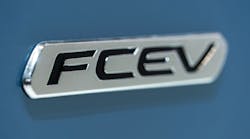Volvo Trucks is running tests of water vapor-emitting fuel-cell electric trucks that have an operational range comparable to diesel trucks—up to 1,000 kilometers, or about 620 miles. A second pilot program phase is to follow in a few years’ time and will see customer tests on public roads, the OEM said.
The testing of fuel-cell electric trucks in commercial traffic will start in 2025 with selected customers in Northern Europe, followed by additional trucks in more countries over the coming years.
See also: The dawn of hydrogen trucks
“I believe that the pilot tests will highlight the potential for fuel-cell electric trucks. The tests will run in a demanding, harsh climate, and [they] also give us a great opportunity for driving with heavy loads up to 65 tons,” said Jessica Sandström, senior VP of global product management at Volvo Trucks.
Hydrogen-powered fuel-cell electric vehicles (FCEV) will be suitable for long-distance and heavy, energy-demanding assignments—the same “use case” as trucks with diesel-fueled internal combustion engines. Fuel-cell electrics also could be a sustainable option where battery charging infrastructure is limited.
“We expect the supply of green hydrogen to increase significantly during the next couple of years since many industries will depend on it to reduce CO2. The fuel-cell trucks will be important for longer and heavier transportations in a few years from now,” Volvo’s Sandström said.
The fuel cells for the Volvo pilot program will be supplied by Cellcentric, the joint venture between usual competitors Volvo Group and Daimler Truck. Cellcentric is tasked with building one of Europe’s largest series production facilities for fuel cells, especially developed for heavy vehicles.
Fuel-cell technology is still in an early phase of development. There remain some challenges, mainly the lack of large-scale supplies of green hydrogen and widely available fueling infrastructure. During the Volvo pilot program, refilling of green hydrogen from renewable sources will be done at a home fueling depot. Green hydrogen is produced by using renewable energy sources such as wind, water, and sun.
See also: Hydrogen fuel cell proponents offer a 'third way'
The hub-and-spoke duty cycle, where trucks return to base each day, presently is gaining in viability for FCEVs, Wido Westbroek, senior director of fuel-cell strategic projects for Cummins, told FleetOwner's sister publication Fleet Maintenance in May, “and so, you’re not looking at the long-distance haulers where they need to have fueling along the road.”
“The other big barrier, of course, is cost,” Westbroek added of what is preventing more heavy-duty hydrogen infrastructure. “Whenever anything starts, the first few, the first 100, even the first 1,000, are way more expensive than when you have tens of thousands, or hundreds of thousands.”
“The costs of hydrogen, vehicles, and hydrogen production all must come down significantly to make hydrogen economically competitive with alternatives,” noted Mike Roeth, who is executive director of the North American Council for Freight Efficiency (NACFE), which released a detailed confidence report on the viability of FCEVs. After speaking with industry experts and researchers, Roeth surmised that “these costs will be reduced through scale and innovation over time.”




